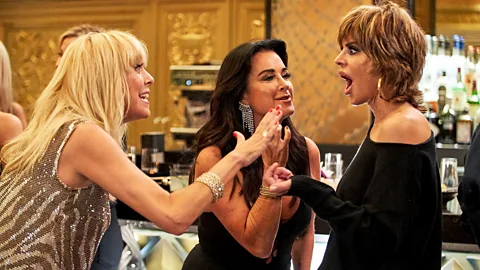 Getty Images
Getty ImagesThese series about wealthy, middle-aged women dealing with personal dramas now span the globe. Here’s why they have acquired such a passionate fanbase –despite the troubles they now face.
It’s a Saturday afternoon and a big, airport-hangar-like event space in south-east London is buzzing with activity. Around 1,000 people have gathered excitedly for the reality TV streaming service Hayu’s FanFest, a convention in which avid viewers of famous reality shows will get to meet-and-greet the stars and watch live panel talks.
Most of the fans are here for one main reason though: The Real Housewives franchise. The multiple series that fall under the Real Housewives umbrella follow the lives of groups of wealthy women, living in cities all over the US and beyond, as they deal with both the day-to-day realities of their lives, but also the tabloid dramas that often emerge through the series itself. Throughout the show, and amid scenes of the women at various alcohol-and-argument filled social events, or discussing said events with each other, they also offer individual confessionals to camera.
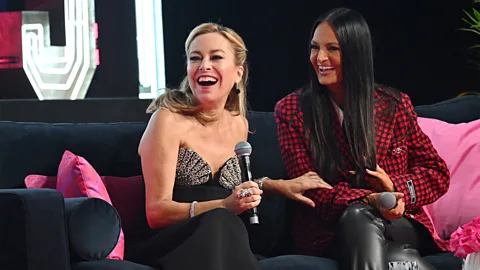 Getty Images
Getty ImagesA long line snakes across the pink-carpeted floor as around a hundred people queue up for a split-second selfie with the four women from the franchise who are appearing today: Lisa Barlow (from Real Housewives of Salt Lake City), Ashley Darby (Potomac), Sutton Stracke (Beverly Hills), and Jessel Taank (New York).
“It’s not just my hobby, it’s my life,” one of the people queuing up, Emily Buttifant, 32, tells the BBC. Her friend, Rachel White, 32, explains that they watch around seven of the 33 different Real Housewives series currently filmed in cities across the world, which often run to 20-plus 52-minute episodes each season: “It’s like a full-time job and we’re very committed! We love the realness of it, getting to know all the cast, then obviously the drama – we’re hooked.”
Elsewhere in the venue, there is an exhibition hosting artefacts from some of the different iterations of the series. A pink, glittery facial roller, a plate of cookies and a pair of leather trousers are all encased in glass boxes, as if they were relics from Tutankhamun’s tomb. To a non-viewer, they won’t have any particular meaning – they are actually props from famously explosive scenes on the show – but to the Real Housewives fandom, the cultural context of these pieces makes them lore: they are everything. The guests are in peals of laughter at seeing the objects in real life, and snap away on their phones, taking photos to post to their social media.
More seriously, two separate lawsuits have been filed against Bravo, the US cable network that created the franchise, by former cast members Caroline Manzo and Leah McSweeney alleging mistreatment. While both cases are still pending, Bravo and Real Housewives executive producer Andy Cohen have denied all claims. A spokesperson for Bravo tells the BBC that they are unable to comment further due to ongoing litigation, but referred back to their previous statement of denial, which included the point: “We are always improving upon our policies and procedures including stricter guidelines on alcohol consumption and direction on when to intervene to maintain safety of cast and crew, increased psychological support, enhanced workplace trainings, and a requirement to provide cast and crew with a direct line to NBCUniversal to raise concerns.”
While the legal complexities continue – at the time of writing, a judge is deciding whether McSweeney’s case will go to trial – it is debatable whether this will have an impact on the leagues of adoring Real Housewives fans across the world, to whom the franchise represents something more than a TV show. Its devotees include everyone from Rihanna (it’s her favourite obsession, the singer says, after her children) to Tilda Swinton, Jon Hamm, and Michelle Obama.
The Real Housewives origin story
The franchise began almost 20 years ago on Bravo as 2006’s The Real Housewives of Orange County, a reality TV show riff on the popular primetime drama of that time, Desperate Housewives. A year later, a show with the working title Manhattan Moms – focused on similar group of older socialite women in New York – was taken under the same umbrella and became The Real Housewives of New York City, before further spin-offs in Atlanta (2008), New Jersey (2008) and Washington DC (2009) were launched. There are currently 21 different US cities hosting the Real Housewives series, and 11 overseas iterations – from the Real Housewives of Athens to Melbourne, Dubai and Budapest.
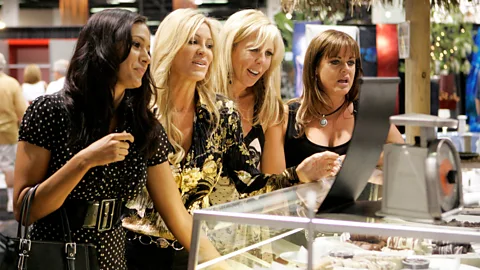 Alamy
AlamyAt first glance, the glossy, chaotic worlds of these designer-clad women could be dismissed as cheap, light entertainment. But that wouldn’t explain the fiercely loyal and committed connection that many people have to the series and its stars. That was exemplified earlier this year by a variation on the If You Asked Me on a Deeper Level meme on TikTok, which saw a Housewives fan make claims for its hidden depths. In a much-viewed post, they declared it was akin to a sociological study: “It’s about complicated group dynamics in female friendships, social hierarchies, understanding the regional differences of the upper class and the social cues”.
“I think that’s absolutely correct,” says Brian Moylan, journalist and author of The Housewives: The Real Story Behind the Housewives, “and that’s always what fascinated me about it. I always liken them to Tennessee Williams characters in that the best ones are a little bit delusional, they think that they’re better than they are and they’re all hiding some kind of darkness or conflict within themselves.”
One of the franchise’s stars, Sutton Stracke, who has been on the Beverly Hills show since 2020, also sees it through a similar high-cultural lens. “I’ve always likened it to Andy Warhol’s The Factory,” she tells the BBC, referencing the artist’s famously debauched New York studio and breeding ground for his “superstars”, adding that “there’s always been hierarchies in female friendships so I think that’s probably true [as to why people watch it]”.
The franchise has also been notable for giving a voice to older, 50-plus women, who traditionally have been marginalised on television. And as privileged as their lives may be, the stars have broken free of the stereotypes often afforded to middle-aged women on screen: these women are wildly glamorous, many of them successful entrepreneurs, with a vibrant social life filled with a group of girlfriends. Together, they have thrown parties, travelled the world, and argued with each other a lot, yet also helped each other through divorces, death, cancer, domestic abuse, IVF journeys and a whole manner of other life-changing experiences.
In every series, viewers watch how these women interact with each other, working through personal events, from the exceptionally trivial (the mystery of who stole someone’s tequila bottle) to the profoundly devastating (being robbed at gunpoint; losing a child). Their straight- to-camera confessionals give viewers insights into their identity and social status within the group, as well as how they’re expected to conform as women where they live.
Laura Grindstaff, a professor of sociology of the University of California, points out that while it could never be viewed as an anthropological study – while not technically scripted, each episode has manufactured narrative “beats”, and topics that that producers choose to focus on and then prompt the women to discuss or confront, while they are filmed by an extensive camera crew – it does have a unique pull for viewers.
“The predictability of the format – strong women characters in luxurious settings navigating life events that generate conflict and drama – coexists with the unpredictability of exactly how each character instigates, responds to and manages these conflicts,” she says.
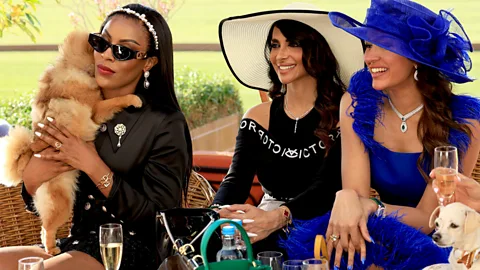 Bravo
Bravo“I think viewers are responding to this tension, along with a related tension between the ordinary and the extraordinary. The women of Housewives are ‘ordinary’ in the sense that they are not professional actors and in the sense that their storylines tap into universal themes of personal struggle, friendship, rivalry, loyalty, betrayal, and so on. They are extraordinary because of their affluence and because their representations are thoroughly structured by the need for drama, more often than not in the form of conflict. The housewives are emotionally volatile, larger-than-life personalities.”
The real v the unreal
And the pleasure comes for the audience when the “real” emerges from the artifice of the “reality” TV set-up, argues Grindstaff: “Viewers enjoy parsing out those moments when authentic or ‘real’ emotion breaks through, in seeing the blend of ‘scriptedness’ and spontaneity unfold, in vicariously enjoying glamour and opulence, in following the arc of a favourite character.”
This delicate balance of the real and the unreal is key to the show’s success. It simultaneously allows viewers to empathise with the housewives in watching them deal with their issues – and find escapist entertainment in their wealth and luxurious lifestyles, as if they are characters in a soap opera.
Fan Marc Blackmore, 33, explains: “I discovered Housewives during Covid,” he says. “I love it on an evening, I can watch it and I can run away from everything else and just watch their lives”.
“Talking to a lot of fans,” explains Moylan, “a lot of people come to Housewives during a dark period. I have a friend whose mother died and this was her escape. There were a ton of new fans during the pandemic – a collective dark time – so there’s something about having to navigate one’s troubles while watching the troubles that these women have, which somehow alleviates our own pain and distress in some kind of weird way.”
There is another simpler pleasure for many Housewives fans: it’s often hysterically funny. Even Oscar-winning script writers couldn’t write real-world episodes like a mime artist interrupting two furious frenemies on The Real Housewives of Potomac, or the New York Housewife who took off her prosthetic leg mid-row and threw it at the table in anger yelling “the only thing that’s fake about me is my leg!”.
The expansion of the Real Housewives-verse has also been taken up well across the globe. While the 21 international series all follow the same format as their US counterparts, they collectively offer insights into life for women of different cultures who again may not have traditionally been featured on TV.
For example, The Real Housewives of Dubai – although it faced criticism from human rights groups when it launched in 2022, asking why a series was being launched in a country with “violence against women“ and “homophobic laws” – has seen scenes like a single mother, Sara Al Madani, teaching her then six-year-old son, Maktoum, how to cook and dine in their traditional way, as she had been brought up to in her Arabian household. She talked about the idea of toxic masculinity and how sometimes, men in her culture are told “they should not show emotions, they should not cry“, as she put it. Al Madani later told Women’s Health magazine her reason for joining the franchise: “I looked at it as an opportunity for me to use it as a window, to show the world and the West how Arab women are stereotyped in a very wrong way. And that we’re not who they think we are”.
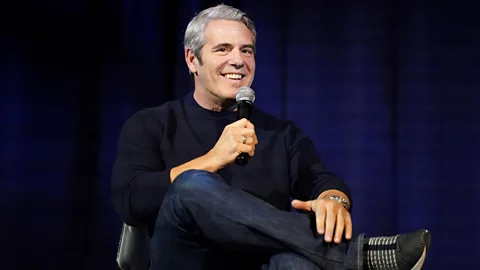 Alamy
AlamyMeanwhile in the South African series set in the city of Durban, one episode saw Housewife Sorisha Naidoo bring together a group of women to celebrate the Hindu festival of Diwali and to introduce them to her lifestyle and beliefs. Though a peaceful dinner party, as any Housewife knows, is a folly; drama inevitably followed.
However the diversity of the franchise only goes so far, of course: for all its increasing cultural and geographical spread, the participants remain uniformly extremely affluent. Among the many criticisms levelled against the franchise is that it promotes conspicuous consumption, while one study from Central Michigan University found that watching the heightened emotion of the dramatic series could “increase aggression, manipulation and narcissism” in viewers.
However Grindstaff cautions that she takes “effects” studies of media, including reality TV, with a large grain of salt. “Effects as measured by self-reports are often unreliable and/or short-lived, and those measured by experiments are also typically short-lived. There’s also the question about causality – does reality TV make people more argumentative or are argumentative people attracted to reality TV? Media consumption is just one aspect of a person’s entire life experience and in the real world outside a research lab, there’s no good way to separate off what influence the media may be having as opposed to other influences in a person’s life”.
For people to dismiss the Housewives as trashy television also reflects a gendered bias, argues Moylan, who in his 2021 book The Real Story Behind the Real Housewives, suggests we should see the fans’ devotion of the franchise as in line with men supporting football teams. “I think people look down on reality in general because it is seen as feminine,” he says. “The audience is mostly women and gay men – who are marginalised in life in general – and so I think that’s why people look down on it, erroneously.”
With fans engaged in parasocial relationships with stars through following them on social media or their podcasts, or seeing them in a live event setting, there are definite parallels with the sporting world, he adds. “It brings people together. It gives us something to talk about. We watch these shows through good and bad; when the team’s playing terribly, we hate them but when they’re playing well, it’s all worth it. It’s about who’s having a good season, who’s having a bad season, what would you do to fix the team, who would you fire, who would you hire?”
What is their future?
However, beyond the general cultural criticism of the shows, there are the continuing lawsuits, and one former housewife, Bethenny Frankel, wants the stars to unionise, amid her championing of a “reality reckoning”. Speaking with the LA Times last November, she said: “There needs to be health insurance. There needs to be proper human resources, and the investigations need to be independent, not internal. There needs to be workplace guidelines for people… There has to be a line. It has to be exploration, not exploitation of people’s lives.”
In a recent interview with Vice, former New York star Aviva Drescher talked about her time on the show and the pressure to perform, comparing her and her fellow Housewives to gladiators “in the arena with millions of people watching”. Cohen – seen as the father figure of the franchise as he helped develop it while working at Bravo in the 2000s and a star in his own right as host of the chat show Watch What Happens Live – previously told Attitude magazine that what’s seen on screen is ‘real’ as: “We cast very highly volatile, emotional, driven, opinionated women, and because of that, they go to town.”
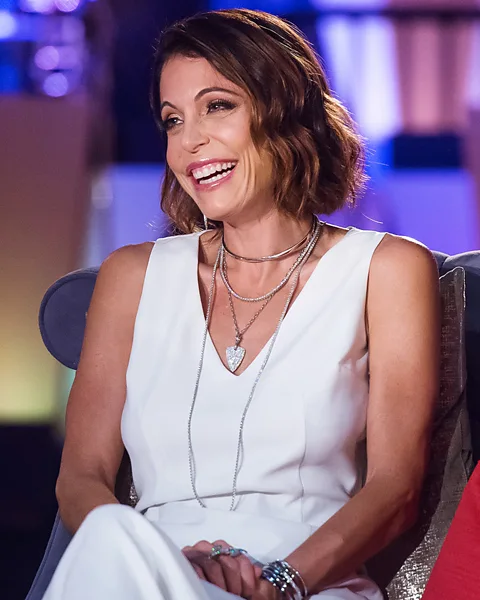 Getty Images
Getty ImagesThe real question is: can the show become more ethical and still provide fans with the drama and emotional connections it’s famed for? Grindstaff says: “The broader question here is whether observational-style reality shows are so unethical they should be shut down. Doing so resurrects an older scenario: the exclusion of ‘ordinary’ people (those who aren’t trained, professional actors) from visibility on television in roles formerly reserved for actors. My guess is that many reality stars and their fans would object, but this doesn’t mean more guard rails should not be in place.”
Almost two decades on from its genesis, remarkably, the franchise shows no signs of slowing down. And while other reality TV shows such as Big Brother or American Idol have fallen out of favour in their later years, the fandom for Real Housewives only appears to be growing bigger, despite the allegations against it, with more people becoming feverishly invested in it across the world.
Back in south-east London, the reality-con event is wrapping up. But there’s one last surprise for the guests. Amid much fanfare, the newest franchise is announced: the debut series of The Real Housewives of London, due late 2025. There is wide-spread screaming from the fans when the news is revealed, with fireworks, balloons and ticker-tape falling from the ceiling. It’s a suitably surprising and dramatic birth of a brand-new chapter as this reality juggernaut rolls on.

